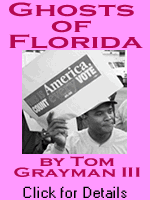
|
|||||||||||||||||||||
 |
|||||||||||||||||||||
 |
|||||||||||||||||||||
 |
Gary
Webb, former investigative reporter at the San Jose Mercury News,
passed
away December 10, an apparent suicide. That the Reagan and elder Bush administrations financed their murderous proxy war in Central America in part with drug money after Congress cut off official funding was old news. Charles Rangel (D-NY) and John Kerry (D-MA) chaired House and Senate subcommittees, respectively, in the late 80s which uncovered ties between drug rings and the sharp knives of US foreign policy in the region. It was one sordid corner of the global web of arms trafficking and official criminality called Iran–contra. Rangel and Kerry called for further and deeper investigations, and both were shut down by their fellow lawmakers. The establishment press, so-called watchdogs of democracy, distorted Rangel’s and Kerry’s statements, ridiculed their allegations, and refused to examine their evidence or conduct probes of their own, effectively killing the story. But in 1996, after a year's investigation, Gary Webb was the right man at
the right place and time. The Mercury News was one of the first to put
its content on the brand new world wide web. Webb convinced his editor
to include significant amounts of his source material including court transcripts,
audio clips, photos and more on the paper's web site. This time the story
could not be contained. Between talk radio,
Gary Webb was attacked and viciously smeared in the mainstream media from the time the article appeared to his Los Angeles Times obituary last month. His editors cravenly apologized and took the story off their Website. By 1998, Webb combined new research with material that couldn't be used in the original series and authored Dark Alliance: The CIA, Contras, and the Crack Explosion, but his career as a reporter was over. Fired from the Mercury News and blackballed from employment at any newspaper, Gary Webb’s life began the downward spiral that ended in his suicide last month.
Thus a flood of media pundits, white opinion leaders, editorial page writers and scholars-for-hire rushed forth to comfort white America with the news that their black neighbors, practically all African Americans, suffer from a peculiar case of chronic mass paranoia. A gargantuan, racist lie was deployed to swallow and conceal the truths that Gary Webb had labored so diligently to bring to light. “Black paranoia” was a very useful diagnosis, tailor-made to convince the white public that further examinations of the CIA connection to crack cocaine were pointless. More than eight years after Gary Webb’s courageous reporting, millions of
outraged citizens demand probes into exit poll manipulations, selective purges
of voter lists, widespread vote fraud and ubiquitous voter suppression
In fact, what the pundits call “black paranoia” is really what the Black Consensus looks like from inside the bubble of white American racism. Metaphors are dangerous, but bubbles are usually delicate and fragile things. An immense weight of lies and denial are already pressing down on the bubble of white racism and the load is about to get heavier. While African Americans and the rest of humanity outside the bubble are always hoping, praying and working for its collapse, we know not to count on it any time soon. And we know that even paranoiacs have some real enemies. |
| January 6 2005 Issue 120 |
|||||||||
|
|||||||||
|
|
|||||||||
| Printer Friendly Version | |||||||||
 |
|||||||||
 |
|||||||||
 |
|||||||||
| |
|||||||||
| |
|||||||||



























